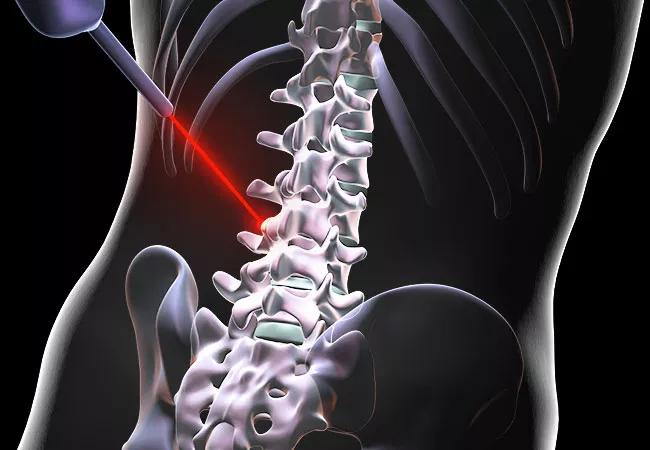Know the pros, cons and limits

Does the idea of stepping out of a surgery center pain-free, with only a small bandage on your back, sound appealing? It’s this image of a quick, easy cure that makes the idea of laser spine surgery so enticing to people with chronic back pain.
Advertisement
Cleveland Clinic is a non-profit academic medical center. Advertising on our site helps support our mission. We do not endorse non-Cleveland Clinic products or services. Policy
But if you are considering back surgery, you should know that while minimally invasive surgery using a laser is effective for some conditions, it isn’t a miracle cure, and it isn’t for everyone.
According to Thomas E. Mroz, MD, Director of Cleveland Clinic’s Center for Spine Health, “If you’re considering back surgery, it’s important to understand the differences between traditional, minimally invasive and laser spine surgery. You want to work closely with your physician to understand which option is best for you,” he says.
Lasers can treat some patients, but only for certain conditions. Experts rarely recommend using a laser for people with degenerative spine disease, for instance. Here’s how it stacks up against other methods.
Traditional surgery. In the traditional “open” approach, the surgeon’s incision goes through the skin to the muscle. Then, the surgeon dissects the muscles away from the spine so that they have a clear pathway to work on the spine. While this has advantages for accessing problem areas, it also poses a risk of damaging the surrounding soft tissue, which can lead to longer hospital stays.
Minimally invasive surgery. The surgeon makes a smaller incision than the one used for a traditional procedure. They use a tool to tunnel to the site of the pain. Because the muscles aren’t elevated from the spine, there is less pain after surgery and the recovery time is often shorter, allowing people to return to their day-to-day activities more readily.
Advertisement
Laser surgery. Surgeons use lasers to remove portions of soft tissue that can compress nerves, such as ligament enlargement or herniated discs. However, lasers are only appropriate for certain conditions. They can help surgeons remove either tumors from the spinal cord or bone and soft tissue from around a nerve. Lasers may also be best for shrinking disc material around a nerve.
Inadequate operation: Perhaps the biggest problem with laser surgery is the risk of having an inadequate operation, which sometimes means you’ll need additional surgery, he says.
If you have leg pain caused by a spinal deformity, minimally invasive or laser surgery may improve the leg pain briefly. But it may not fully treat the root cause.
“You may have pain from the back instability,” he says. “If all one uses is a laser, the bigger problem is missed.”
Nerve damage: Using a laser during surgery can sometimes limit nerve damage. But in the hands of an inexperienced surgeon, a laser can actually increase the chances of tissue or nerve damage.
To ensure that you’re getting the best treatment for your condition, do your homework and prepare questions for your surgeon.
Questions you should ask include:
The bottom line is that more complicated back problems often require traditional surgery for the best outcome.
“There is no magic bullet or miracle for many spinal diseases, but technology and techniques have evolved greatly. Every patient and every spinal condition must be individually assessed so that we can deliver the most personalized, effective, and technologically advanced surgical treatment,” says Dr. Mroz.
If you are considering surgery, he recommends choosing an experienced physician who is trained in both traditional and minimally invasive approaches.
Advertisement
Learn more about our editorial process.
Advertisement

Hanging upside down for any length of time may decompress the tension in your spine

Drinking alcohol can cause nerve pain, dehydration and weight gain, which can all lead to back pain

Your sleep position, immobility, mattress and underlying conditions can all cause morning back pain

Rest may be all you need to get rid of running-related lower back pain

It’s always a good idea to let a healthcare provider know about any back pain you’re experiencing, especially if it results from trauma or persists longer than three months

From physical and biofeedback therapy to nerve ablations and blocks, there are many nonsurgical options for managing back pain

Rest, physical therapy, acupuncture and nerve blocks are just a few ways to find relief

Get moving, use cold packs, and try yoga and stretches to ease back pain

The tropical fruit is a good source of antioxidants and vitamin C

Most people fall asleep within 10 to 20 minutes, but if your experience is different, adjusting your sleep schedule may help

Exploring your hidden side can lead to better understanding of what makes you tick